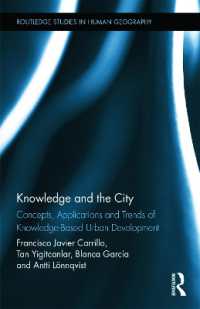- ホーム
- > 洋書
- > 英文書
- > Literary Criticism
Full Description
This volume brings together eleven chapters on the genre of Latin elegy by leading scholars in the field.
Latin elegy is typically thought to have flourished for a brief period at Rome between c. 40 BC and the early decades of the first century AD; it was the pre-eminent vehicle for writing about amatory matters in this period and among its principal exponents were Propertius and Ovid, whose works constitute the focus of this volume. Their poems and poetic collections were, however, by no means restricted to the themes of love, even if amatory concerns often surface at unexpected moments in texts that are not ostensibly concerned with love. Both poets were alive to their precursors' writings in elegiacs, and so aetiological themes and reflection on contemporary political circumstances form an integral part of their poetry. Such concerns are explored in some of the chapters on Propertius, on Ovid's Fasti and exile poetry, and also in a Renaissance elegy that looks closely to its literary heritage as it comments on the concerns of its day.
Some contributions to this volume also shed new light on the typically elegiac conceit of separation, notably in amatory and exilic texts, while others look to conceptions of Roman identity and the relationship between the natural world and the cultural, political and literary spheres. All of the chapters share an interest in the close-reading of texts as the basis for drawing broader conclusions about these fascinating authors, their poetry, and their worlds.
Contents
Introduction
1: Daniel Jolowicz: Possessive pronouns in Latin love elegy: Propertius and the land confiscations
2: Donncha O'Rourke: Preposterous Propertius
3: Matthew Robinson: Propertius 3.10: A Festschrift for Cynthia?
4: Jennifer Ingleheart: Reading sex in Amores 1.4 and 1.5: repetition, coupling, and Ovidian erotics
5: Rebecca Armstrong: Sowing the seeds of love: Ovid's Sementivae (Fasti 1.655-704)
6: Kre%simir Vukovi'c: Rivers and Fluid Identities in the Fasti
7: Bobby Xinyue: Humiliation and revenge in Ovid's Fasti
8: Gail Trimble: Horatian moments in Ovid's career and the end of Fasti 6
9: T. E. Franklinos: Trying to make up for lost time with dear friends in Ovid, Tristia 3
10: Bruce Gibson: Closing time: moving towards the end in Epistulae ex Ponto 4
11: Helen M. Dixon: Talking heads, talking statues: Ovidian antiquarianism in Renaissance Rome
Bibliography
Index locorum
Index rerum








